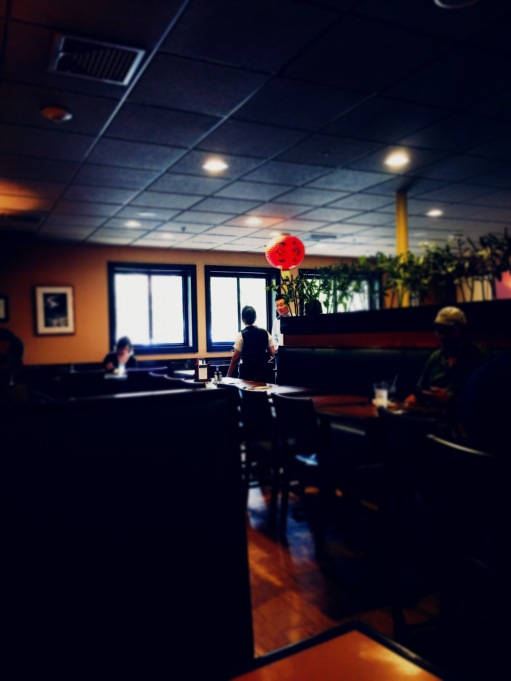
She works in a dingy pseudo-Chinese restaurant that dons several hats: a bar, a lounge, and a dance hall harkening back to the eighties. The interior is soaked in shades of reddish-brown timber. An earthy scent weighs on the entire ambiance—the glimmer from the gilded Buddhas and the gaudy frescoes gives it the air of a Chinese burlesque. She half-expects people to burst into song, in cheongsams or cone hats, juggling yellow fortune cookies and mechanically mimicking the paw-wave of the fortune cat. “Exotic Chinese Fare!”
It doesn’t take her long after she first got here to find out that restaurants spinning an identical concept sprout out in this New England city like a sea of bamboo shoots after a spring rain—they run the gamut from homely to inauthentic to tacky to tackier. She doesn’t know what to make of it; perhaps, this sensation of her sphincter contracting and her skin aging is a sign of a run-down, worn-out spirit. Not just that. Sometimes, she catches a glimpse of herself: a stooping, indistinct shape in the glass windows with arms as thin as chicken feet. Tòu míng. She is sprinting in the snowy countryside. Slow down, màn diǎn. Down winding dirt paths that converge with the silken moonlit sky, every step is a frame in a receding reel of seasons. Chūn xià qiū dōng. A girl in pigtails tied with glossy red ribbons inhales to puff up her pudgy cheeks, flushed like a freshly picked apple, takes a quick, bold lick of a fistful of snow and giggles like wind-bells in the breeze. The restaurant window lightly quivers with her unadulterated wonder and the interior seems cheerier to the eye for a while.
Děng děng wǒ, she says to the girl. But the grimy windows can’t bear the weight of her gaze. She stares at her history until it stares her out of her own countenance. The bright-eyed girl cannot stay for long because this world of General Gau’s chicken, fortune cookies, tips, foreign tongues, white ghosts, and imposing ivy-covered Georgian collegiate buildings is not for her. Sometimes, when she closes her eyes, she is still sprinting, but the dark rolling hills and the moonless terrain no longer look familiar and she doesn’t stop to think of where she is going because she just might not know anymore. After a while, these images lock themselves up in a room. What room? She has misplaced the key. A life before now is—is increasingly like a film that she has watched a long time ago, a familiar mélange of etched lines, lilting duets between red-cheeked girls and hardworking boys, a rotating roster of characters, and blurry details. What stands out is the ending. A cheap triumph.
In this city reside smiling students in woolly red sweaters and bleached collars, ambition penetrating through their eyes and gleaming off their slick silver laptops, so young and yet already exuding the scent of privilege and success—Like that son of whats-his-name with those foreign candies. That must have been thirty years ago!—but here it’s doused in an entitled sense of smartness. It drips all over the floor she mops, a stain that she can’t unsee. She cannot help but overhear sometimes, the students rattling off English like a hymn to a partial God whose covenant is so complex that even after thirteen years here she cannot pray to speak. That is how she always tells the students apart from the other diners. She will not bear to tell the rosy-cheeked girl licking snow what it is like here. Tell her what? The floor is never clean.
Sometimes, she will look up as the door chimes and see in the contours of a fresh-faced student the face of her xiǎomèi back home. The affection swells and wells up in her hands and eyes and lips and she cannot keep herself from breaking loose from wobbly English to ask them for their order again in halting Chinese. They will crinkle their brows distantly, or in polite confusion, and then she knows what she already feels in her bones—they are all not xiǎomèi and can never be.
It’s a hazy afternoon when business is a trickle that she decides to eat one of those fortune cookies that the restaurant gives to diners with the bill. The slightly sweet, but almost tasteless cookie pokes against the roof of her mouth. She crunches it hard, then pulls out the half-wet strip of paper from between her chapped lips.
She doesn’t understand the words on it at the first quick glance. As she makes out the aphorism, she feels and sees first the grease on the paper, the curled edge of it slightly soggy with her saliva, and the words in tiny print, an almost cruel shade of blue on white.
L-i-f-e i-s f-a-i-r t-o a-l-l.
She watches the white strip paper float, excruciatingly slow, before soundlessly hitting the ground. At the periphery of her vision, the ceiling overhead seems to close in on her. Méi guānxi, méi guānxi, méi guānxi. A frantic motto. The ceiling seems to collapse but it doesn’t. The ceiling doesn’t collapse but she knows as something strong finally begins to crumble.
I don’t understand the Chinese (?), but it’s still a good story
LikeLiked by 1 person
Thank you : )
LikeLike